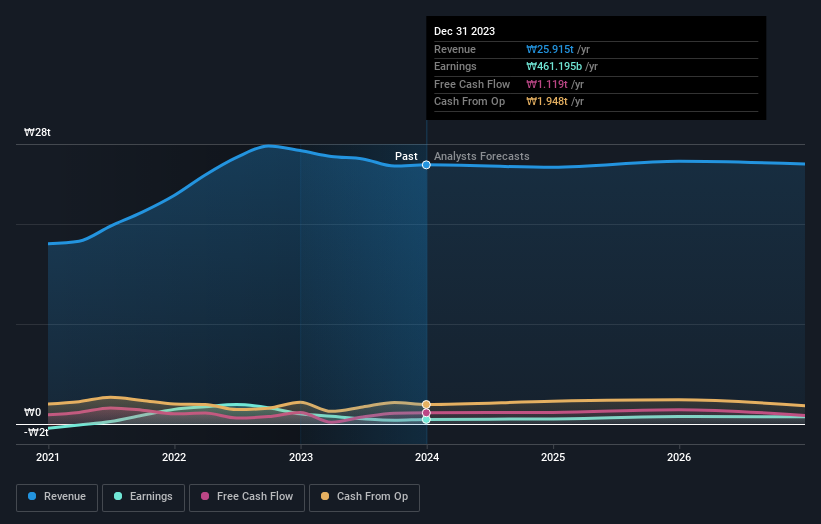Stock Analysis
- South Korea
- /
- Metals and Mining
- /
- KOSE:A004020
Retail investors invested in Hyundai Steel Company (KRX:004020) copped the brunt of last week's ₩158b market cap decline

Key Insights
- Significant control over Hyundai Steel by retail investors implies that the general public has more power to influence management and governance-related decisions
- 51% of the business is held by the top 8 shareholders
- Insider ownership in Hyundai Steel is 12%
Every investor in Hyundai Steel Company (KRX:004020) should be aware of the most powerful shareholder groups. We can see that retail investors own the lion's share in the company with 43% ownership. In other words, the group stands to gain the most (or lose the most) from their investment into the company.
As a result, retail investors as a group endured the highest losses last week after market cap fell by ₩158b.
Let's take a closer look to see what the different types of shareholders can tell us about Hyundai Steel.
Check out our latest analysis for Hyundai Steel

What Does The Institutional Ownership Tell Us About Hyundai Steel?
Many institutions measure their performance against an index that approximates the local market. So they usually pay more attention to companies that are included in major indices.
As you can see, institutional investors have a fair amount of stake in Hyundai Steel. This suggests some credibility amongst professional investors. But we can't rely on that fact alone since institutions make bad investments sometimes, just like everyone does. If multiple institutions change their view on a stock at the same time, you could see the share price drop fast. It's therefore worth looking at Hyundai Steel's earnings history below. Of course, the future is what really matters.

We note that hedge funds don't have a meaningful investment in Hyundai Steel. Kia Corporation is currently the largest shareholder, with 18% of shares outstanding. For context, the second largest shareholder holds about 12% of the shares outstanding, followed by an ownership of 7.2% by the third-largest shareholder.
We did some more digging and found that 8 of the top shareholders account for roughly 51% of the register, implying that along with larger shareholders, there are a few smaller shareholders, thereby balancing out each others interests somewhat.
While studying institutional ownership for a company can add value to your research, it is also a good practice to research analyst recommendations to get a deeper understand of a stock's expected performance. There are a reasonable number of analysts covering the stock, so it might be useful to find out their aggregate view on the future.
Insider Ownership Of Hyundai Steel
While the precise definition of an insider can be subjective, almost everyone considers board members to be insiders. The company management answer to the board and the latter should represent the interests of shareholders. Notably, sometimes top-level managers are on the board themselves.
Most consider insider ownership a positive because it can indicate the board is well aligned with other shareholders. However, on some occasions too much power is concentrated within this group.
Our information suggests that insiders maintain a significant holding in Hyundai Steel Company. It has a market capitalization of just ₩4.1t, and insiders have ₩495b worth of shares in their own names. That's quite significant. Most would be pleased to see the board is investing alongside them. You may wish to access this free chart showing recent trading by insiders.
General Public Ownership
With a 43% ownership, the general public, mostly comprising of individual investors, have some degree of sway over Hyundai Steel. While this size of ownership may not be enough to sway a policy decision in their favour, they can still make a collective impact on company policies.
Public Company Ownership
Public companies currently own 24% of Hyundai Steel stock. We can't be certain but it is quite possible this is a strategic stake. The businesses may be similar, or work together.
Next Steps:
I find it very interesting to look at who exactly owns a company. But to truly gain insight, we need to consider other information, too. Case in point: We've spotted 2 warning signs for Hyundai Steel you should be aware of.
If you would prefer discover what analysts are predicting in terms of future growth, do not miss this free report on analyst forecasts.
NB: Figures in this article are calculated using data from the last twelve months, which refer to the 12-month period ending on the last date of the month the financial statement is dated. This may not be consistent with full year annual report figures.
Valuation is complex, but we're helping make it simple.
Find out whether Hyundai Steel is potentially over or undervalued by checking out our comprehensive analysis, which includes fair value estimates, risks and warnings, dividends, insider transactions and financial health.
View the Free AnalysisHave feedback on this article? Concerned about the content? Get in touch with us directly. Alternatively, email editorial-team (at) simplywallst.com.
This article by Simply Wall St is general in nature. We provide commentary based on historical data and analyst forecasts only using an unbiased methodology and our articles are not intended to be financial advice. It does not constitute a recommendation to buy or sell any stock, and does not take account of your objectives, or your financial situation. We aim to bring you long-term focused analysis driven by fundamental data. Note that our analysis may not factor in the latest price-sensitive company announcements or qualitative material. Simply Wall St has no position in any stocks mentioned.

Simply Wall St
About KOSE:A004020
Hyundai Steel
Hyundai Steel Company, together with its subsidiaries, manufactures and sells steel and other industrial metal products in Korea, rest of Asia, the United States, and Europe.
Excellent balance sheet, good value and pays a dividend.
